

Documentation. BRCK: Your backup generator to the Internet. TechCrunch. Carobotero-co. Mobile services in poor countries: Not just talk. Home - ICT Update, a current awareness bulletin for ACP agriculture. Empowering IDP with SMS: A Randomized Controlled Trial in Bogotá. Abstract We carried out a randomized controlled trial in Bogotá, the recipient of Colombia´s highest number of internally displaced people (IDP), to assess whether the use of SMS to communicate eligibility to social benefits fosters the welfare of victimized internal refugees.
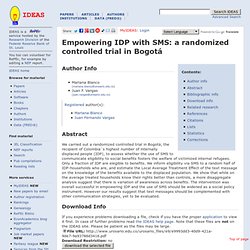
Only a fraction of IDP are elegible to benefits. We inform eligibility via SMS to a random half of IDP-households who are, and estimate the Local Average Treatment Effect of the text message on the knowledge of the benefits available to the displaced population. Mobile Apps: The World Bank Reviews Lessons Learnt. AudienceScapes overviews the World Bank’s latest study on the use of mobile applications for the health, agriculture and rural development sectors.
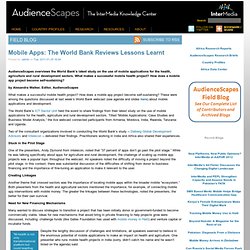
What makes a successful mobile health project? How does a mobile app project become self-sustaining? By Alexandra Walker, Editor, AudienceScapes What makes a successful mobile health project? Whose choice? ICTs for “development” and the lives people value. Tuesday, February 15, 12:30 pmBerkman Center, 23 Everett Street, second floorRSVP required for those attending in person to Amar Ashar (ashar@cyber.law.harvard.edu)This event will be webcast live at 12:30 pm ET and archived on our site shortly after.
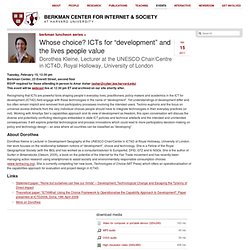
Recognising that ICTs are powerful tools shaping people’s everyday lives, practitioners, policy-makers and academics in the ICT for development (ICT4D) field engage with these technologies in the name of “development”. Yet understandings of development differ and too often remain implicit and removed from participatory processes involving the intended users. Techno-euphoria and the focus on universal access distracts from the very individual choices people should have to integrate technologies in their everyday practices (or not). About Dorothea. ‘Hope Phones’ Saving Lives in Malawi. Photo: Malawians pose for a quick photo.
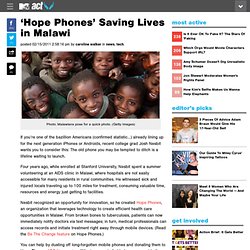
(Getty Images) If you’re one of the bazillion Americans (confirmed statistic…) already lining up for the next generation iPhones or Androids, recent college grad Josh Nesbit wants you to consider this: The old phone you may be tempted to ditch is a lifeline waiting to launch. Joel Lamstein: International Women's Day: Can Technology Close the Gap for Girls and Women? In 1906, a woman by the name of Welthy Fisher launched a school in China to give girls the skills they needed in order to play a greater role in their society.
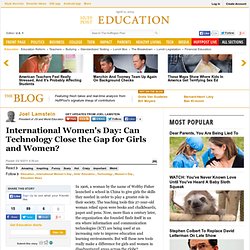
The teaching tools this 27-year-old woman relied upon were books and chalkboards, paper and pens. Communication for Development - Introduction. Communication for Development goes beyond providing information C4D involves understanding people, their beliefs and values, the social and cultural norms that shape their lives.
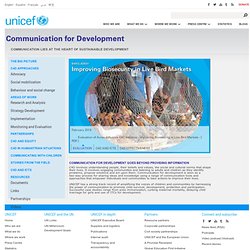
Mucho más que una computadora. There's Not an App for That. The United Nations' agency for ICTs, the International Telecommunication Union (ITU), marks today, 17 May, as World Telecommunication and Information Society Day (WTISD).
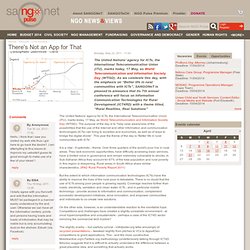
The purpose of the day is to “help raise awareness of the possibilities that the use of the Internet and other information and communication technologies (ICTs) can bring to societies and economies, as well as of ways to bridge the digital divide”. This year the theme of the day is “Better life in rural communities with ICTs”.
It is a vital - if optimistic - theme. Over three quarters of the world's poor live in rural areas. They lack economic opportunities, have difficulty accessing basic services, have a limited voice in governance and remain extremely vulnerable to shocks. But the extent to which information communication technologies (ICTs) have the ability to improve the lives of the rural poor is debatable. ICT access in Latin America. evidence from household level. Vergara, Sebastián and Grazzi, Matteo (2011): ICT access in Latin America. evidence from household level.
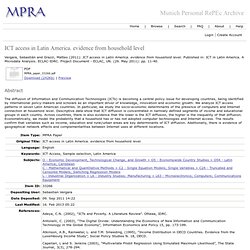
Published in: ICT in Latin America. A Microdata Analysis. ECLAC-IDRC. Project Document - ECLAC, UN. (29. Latin America and the Caribbean: How many schools are connected in the digital age? El precio perpetúa la brecha digital. Los consumidores a nivel mundial pagan hoy hasta un 50% menos que hace dos años por los servicios de banda ancha.
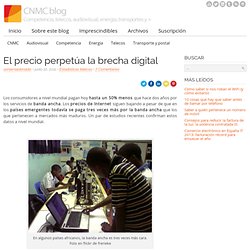
Internet Access Is Not a Human Right. El conflicto entre propiedad intelectual y derechos fundamentales. La copia digital de obras protegidas por la propiedad intelectual, y más concretamente la copia privada digital a través de Internet, ha determinado un serio debilitamiento de la principal prerrogativa que el copyright otorga a las industrias culturales; esto es, el derecho exclusivo a controlar la reproducción de las obras, sobre el que se ha construido todo el entramado jurídico de la economía de las industrias culturales.
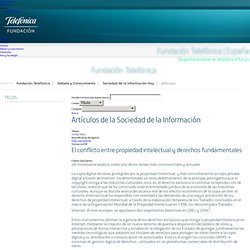
Policy and regulatory issues in the mobile internet. By Russell Southwood (APC) , May 2011 This paper is part of a series of policy briefs on the mobile internet from a human rights perspective The mobile internet as new media The mobile phone is rapidly becoming media, both as a primary source for content and as a platform for delivery of content. With rapid changes in what a mobile phone can actually do, millions of people are using it to access the internet and to upload and distribute content. In many developing countries, a mobile phone is the technology device most likely to be owned by people after a radio but, unlike the latter, most people will carry the mobile phone with them almost everywhere.
Affordable Technologies for Supporting Learning and Collaboration in Africa. Claire Sibthorpe There is ongoing innovation in terms of technology and its cost. This has included, for instance, the introduction of lower cost computers (e.g. netbooks and OLPC), the explosion in access to mobile phones and the emergence of devices such as iPads and e-readers. There are also a growing number of projects which seek to use some of these mobile devices to support learning and collaboration. Adult literacy, IT and computer skills for economical sustainability, acquisition and dissemination of knowledge. Introduction:Most youth from communities in remote and marginalized areas lack skills that could easily be achieved through proper use of computers and the internet to acquire knowledge vital for business management.
The Problem: Lack of proper education and computer skills (ICT) is a major setback towards marginalized communities becoming self reliant and thus economically empowered. The Idea:Through education and teaching of computer skills to the schooling population and the community we shall be able to achieve a self sustainable and economically empowered population in the future. Youth require skills such as business management, modern farming methods and general knowledge. Vol 6, Special Edition 2010 (Harvard Forum II Essays) Development outcomes of internet and mobile phones use in Kenya: the households' perspectives. ICTs for Development. ICT4D Career Network. If you're new here, you may want to subscribe to my RSS feed. Thanks for visiting! Hi. I’m Wayan. They say I’m a noted expert on the use of ICT for economic development. I would hope so. I’ve designed and deployed ICT solutions for several “big name” companies like USAID, UNICEF, Cisco Systems, Hewlett-Packard, PricewaterhouseCoopers, the World Bank, and the government of Jordan.
Public Policy Blog. Making money with mobile apps. October 20, 2011, 8:00 AM — So you're a developer and you want to strike out on your own and get a piece of that lucrative mobile-apps market. Who can blame you? Research firm Gartner predicted last January that mobile application revenue would nearly triple this year to $15.1 billion from $5.2 billion in 2010. A month later, rival analyst firm Forrester Research upped the ante, forecasting that mobile-app revenue would hit $38 billion by 2015, with tablet app sales comprising $8.1 billion of that total, up from $300 million last year. Your next job: Mobile app developer? It's like printing money!
One small problem: The apps market is incredibly crowded, and getting more so as developers rush to satisfy the seemingly insatiable demand for apps by the growing global army of mobile device users. There are more than 500,000 apps available at Apple's App Store, while Google's Android Market features more than 225,000. Vast riches await (a lucky few) iPhone apps developers. Debates: Personal Computing. CEPAL propone parámetros para definir la banda ancha en América Latina.
Se consideraron elementos como velocidad y experiencia del usuario. Con el objetivo de orientar las políticas públicas en la región, el Observatorio Regional de Banda Ancha de la CEPAL (ORBA) propuso una serie de parámetros de conectividad, velocidad y experiencia de usuario para definir este servicio de internet. La propuesta fue aceptada por los representantes de los 9 países de América Latina que participaron en la cuarta reunión del Diálogo Regional de Banda Ancha realizado el 21 de octubre en la sede del organismo en Santiago, Chile.
A la reunión asistieron los responsables de las políticas nacionales de banda ancha de Argentina, Brasil, Chile, Colombia, Costa Rica, Ecuador, Paraguay, Perú y Uruguay. Challenge: Future Applications for Development. Development Informatics Working Paper No. 46 - ICTs and Informal Learning in Developing Countries. This Working Paper is part of the Development Informatics series. From smart phones to smart farming: Indigenous knowledge sharing in Tanzania. Many people believe communications technology helps the developing world by allowing people to link up with the ‘West’ and be given information and knowledge. It is often people in the developing world with the knowledge, and what technology can instead do is help them unlock that knowledge and share it with one another. Eugenio Tisselli is a PhD student, teacher, artist and mobile technology project developer.
In this latest Digital Diversity he explains how mobile communications can help isolated communities create self-supporting knowledge-sharing networks. This is what Sauti ya wakulima, a group he initiated, have been doing in rural Tanzania. Espectro en América Latina: síntesis complementaria de los informes a los estudios de caso de Argentina, Brasil, Colombia, Ecuador, Perú y Venezuela. Top 10 Tech Concepts You Always Wanted To Learn About (But Never Did) Store your data on someone else's computer, hope they don't do anything bad with it or decide to shut down.